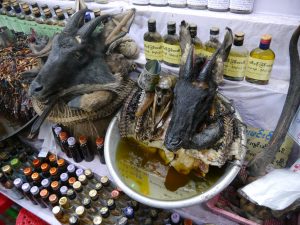Special Economic Zones set up to promote trade between China and its mainland Southeast Asian neighbors are facilitating the illegal trade of wildlife products in the region, according to the wildlife trade watchdog group TRAFFIC.
TRAFFIC’s latest market survey, conducted in 2019 and 2020, found that the wildlife trade that has long taken place in mainland Southeast Asia continues to flourish in the interstices of state jurisdictions.
The group found close to 78,000 illegal wildlife parts and products on sale in more than 1,000 outlets across Thailand, Laos, Cambodia, Vietnam, and Myanmar. These included everything from pangolin scales and helmeted hornbill pendants to trinkets carved from ivory and rhino horn.
Most interestingly, a significant part of this trade activity was observed in Special Economic Zones (SEZs) established to encourage increased trade and investment from China.
Among the examples cited by TRAFFIC were the Golden Triangle Special Economic Zone, a casino fiefdom run by a Chinese businessman in northern Laos close to the country’s borders with Myanmar and Thailand, and a similar SEZ at Boten on the Laos-China border. The report also cites the SEZ in Sihanoukville in southern Cambodia, which in recent years has grown into a sybaritic tourism hotspot dominated by Chinese-run casinos.
Like other illicit trades, the trade in endangered wildlife has flourished in mainland Southeast Asia due to a combination of loose regulatory frameworks and proximity, via increased infrastructure ties and economic integration, to China’s booming economy –the very factors that have driven the proliferation of SEZs in countries like Cambodia and Laos.
In particular, Chinese tourist demand has been an important driver of the wildlife trade in the mainland Southeast Asian countries. Though demand for wildlife parts remains a distinctly minority taste, the sheer number of Chinese tourists visiting the lower Mekong countries – around 20 million per year, prior to the pandemic, according to TRAFFIC – has created a strong pool of demand for endangered wildlife. These include exotic meats, known in Chinese as yewei, or “wild taste,” luxury knick-knacks carved from ivory, and wildlife products believed to have potent medicinal properties.
Many of these tourist arrivals don’t appear in the official statistics. For instance, in Mong La, a rebel-held sliver of territory on the border between China and Myanmar’s Shan State that has long been notorious for its casinos and open-air wildlife markets, many of the Chinese visitors come illegally to avoid Beijing’s bans on gambling.
“The variety and prevalence of illegal wildlife trade in several locations emphasized that the circumstances facilitating illegal trade have not only remained but, in some cases, proliferated,” TRAFFIC’s Agkillah Maniam said in the press release accompanying the survey’s release in early June.
TRAFFIC observes that demand for ivory in particular has grown since the Chinese authorities cracked down on the trade within China in 2017. As with the logging bans in Thailand and Vietnam that pushed illegal loggers into the pristine forests of Cambodia and Laos, these Chinese restrictions have simply displaced the supply beyond China’s own borders, into the loosely governed regions of the lower Mekong.
The link to Chinese tourist flows means that unlike the region’s illegal drug trade, which has expanded and diversified significantly despite the COVID-19 pandemic, the wildlife trade has been impacted by the travel restrictions designed to stem the spread of the disease. Surveys conducted by TRAFFIC in late 2020 showed items such as ivory being sold in smaller volumes.
However, the group suggested that business might rebound once travel restrictions are lifted, citing the Vietnamese authorities’ December 2020 seizure of 93 kilograms of African rhino horns from a warehouse near in Ho Chi Minh City as a sign that the pandemic has placed only a temporary brake on the region’s wildlife trade.
“It would be naïve to think that the pandemic alone will dampen wildlife crime in the long term,” Kanitha Krishnasamy, director for TRAFFIC in Southeast Asia, said in a press statement. “Monitoring and investigations must continue. Ground-truthing is critical to accurately understand how traffickers, traders, and consumers respond and adapt to changes.”

































